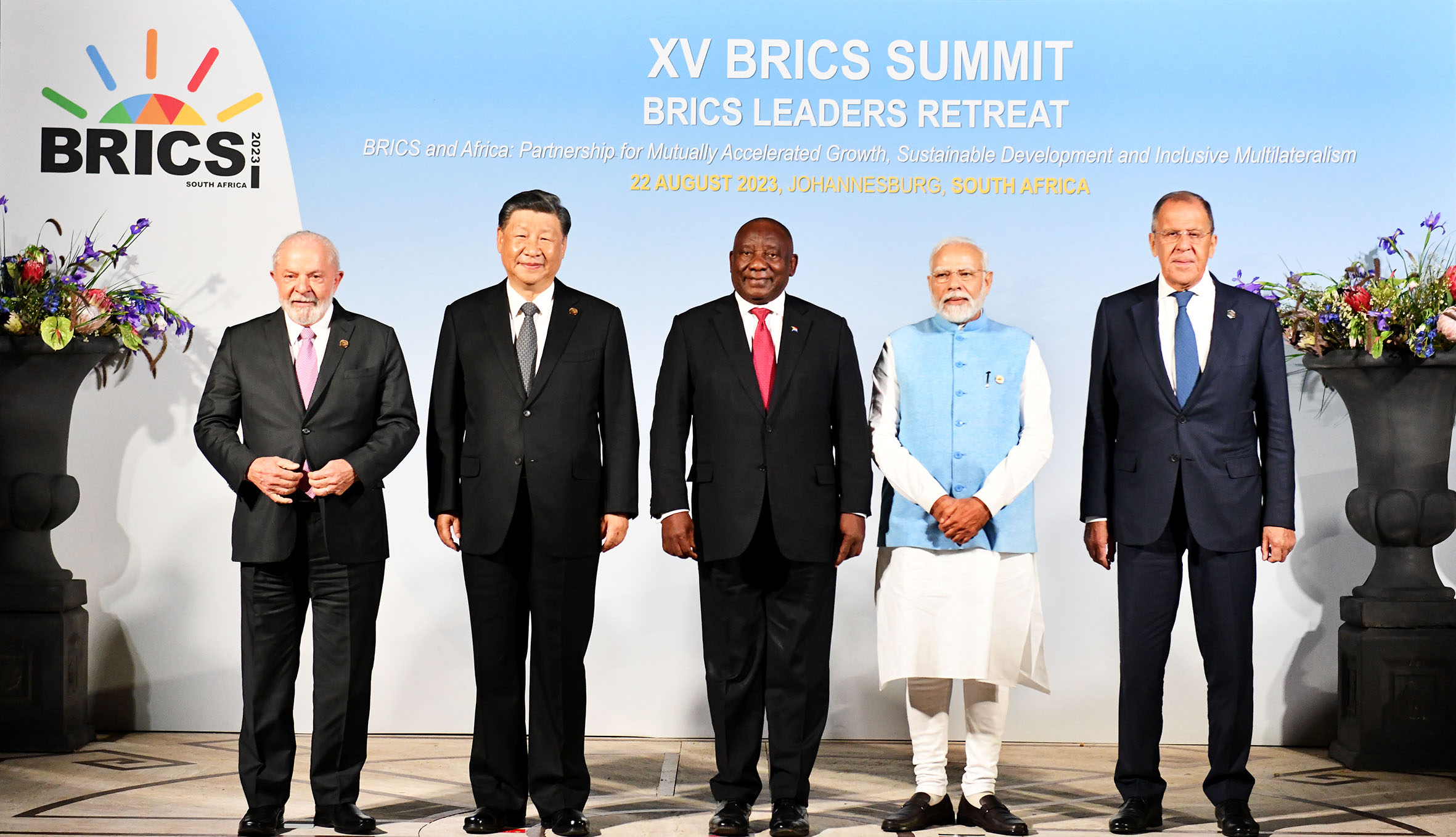ASTANA – President of Kazakhstan Kassym-Jomart Tokayev, who is expected to address the BRICS+ Dialogue via video conference on Aug. 24 as part of the 15th BRICS summit in Johannesburg, is likely to focus on unlocking the potential of transport routes in a broader effort to enhance economic interaction, according to Bauyrzhan Auken, the senior expert of the Asian Studies Department at the Kazakhstan Institute of Strategic Studies.

Tokayev addresses the meeting on Aug. 24. Photo credit: Akorda.kz
Tokayev will participate in the meeting as the Chairman-in-Office of the Shanghai Cooperation Organization (SCO). The three-day summit of BRICS, which owes its name to the initials of its five member states – Brazil, Russia, India, China, and South Africa, focuses on the future of the bloc.
Speaking of Tokayev’s upcoming address to the dialogue, Auken said the remarks will attract “special attention” given his vast diplomatic experience and that he represents the SCO.
“Based on Kazakhstan’s foreign policy agenda, it is expected that the President’s proposals and initiatives will be aimed at ensuring security, preserving peace and trust between the BRICS member states. Special attention will be paid to developing transportation routes connecting North-South and West-East and strengthening economic ties, which are important for us,” Auken told The Astana Times.
What is BRICS?
Initiated by Russia, BRICS constitutes a partnership among five prominent emerging markets and developing countries. Brazil, China, India, Russia, and South Africa represent over 42% of the global population, 30% of the world’s territory, 23% of GDP and 18% of global trade.
The economic influence of BRICS is particularly driven by the growth of China, which accounted for over 70% of BRICS GDP in 2021.

From L to R: Brazilian President Luiz Inácio Lula, China’s President Xi Jinping, South African President Cyril Ramaphosa, Indian Prime Minister Narendra Modi, Russian Foreign Minister Sergei Lavrov. Photo credit: BRICS Twitter page
The first BRIC Summit was held in 2009 in Russia. South Africa was invited to join in December 2010, forming BRICS.
The shared commitment to restructuring the global political, economic and financial architecture to be more equitable, balanced and representative and amplifying the voices and interests of the broader global South is the founding value of the bloc.
The partnership cuts across three key areas – political and security cooperation, financial and economic cooperation, and cultural and people-to-people cooperation.
Expansion of the bloc
President of South Africa Cyril Ramaphosa, whose country chairs BRICS in 2023, announced in an Aug. 24 media briefing the consensus the group has reached on the first phase of the expansion process. Further phases will follow, he added.
Argentina, Egypt, Ethiopia, Iran, Saudi Arabia and the United Arab Emirates are expected to become full members of BRICS, starting from Jan. 1, 2024.
“We value the interest of other countries in building a partnership with BRICS. We have tasked our foreign ministers to further develop the BRICS partner country model and a list of prospective partner countries and report by the next summit,” said Ramaphosa.
What drives countries’ interest in BRICS?
Auken noted cooperation with BRICS boosts the effectiveness of intercontinental cooperation of developing economies.
“The organization is an example of effective cooperation between developed states. Many countries have shown interest in joining the bloc due to the great prospects for development. BRICS has created a mechanism of contingent reserves, which will provide financial support to protect against global liquidity problems. The organization has also established a bank to finance sustainable development and infrastructure projects in the BRICS countries,” said the expert.
Kazakhstan’s vision of BRICS
Kazakhstan, the largest Central Asian economy that shares borders with Russia and China, has grown interested in the BRICS partnership. While not an official member, the country has participated in several BRICS summits and discussions, expressing its desire to deepen ties with the alliance.
“For Kazakhstan, BRICS can become a facilitator of deepening cooperation with the countries of South America and Africa,” said Auken.
The expert noted that Kazakhstan’s main incentive for expanding cooperation with BRICS is attracting foreign direct investment.
The United Nations Conference on Trade and Development (UNCTAD) 2023 report indicates that as a grouping, BRICS has witnessed a more than fourfold increase in their annual FDI inflows, from $84 billion in 2001 to $355 billion in 2021.
Another benefit for Kazakhstan is access to an enormous BRICS market and improved trade relations, including as an agricultural exporter. According to the Kazakh Foreign Ministry, Kazakhstan’s trade turnover with BRICS exceeded $50 billion in 2022 and $45 billion in 2021.
Kazakhstan’s aspirations to become a regional hub align closely with the BRICS agenda. The alliance supports projects that boost connectivity, including via the New Development Bank. Established in 2015, it funds infrastructure and sustainable development initiatives.
Addressing the High-Level Dialogue on Global Development on the margins of the 14th BRICS Summit in June 2022, Tokayev expressed Kazakhstan’s keen interest in developing a vibrant partnership with BRICS countries. First Deputy Foreign Minister Kairat Umarov reiterated the interest at a June 2 meeting of BRICS foreign ministers in Cape Town.
“A balanced approach of Kazakhstan to participation in international organizations like BRICS will allow our country not only to strengthen its role in the global economy, but also to contribute to its interconnected and sustainable development, which will naturally have a positive impact on the welfare of the citizens of Kazakhstan,” said the expert.
Kazakhstan’s active participation in such organizations as the SCO, the Organization of Turkic States, the Eurasian Economic Union, and joint work on the Belt and Road initiative opens up a vast potential in establishing Kazakhstan as a transport hub of Eurasia, the expert said.

